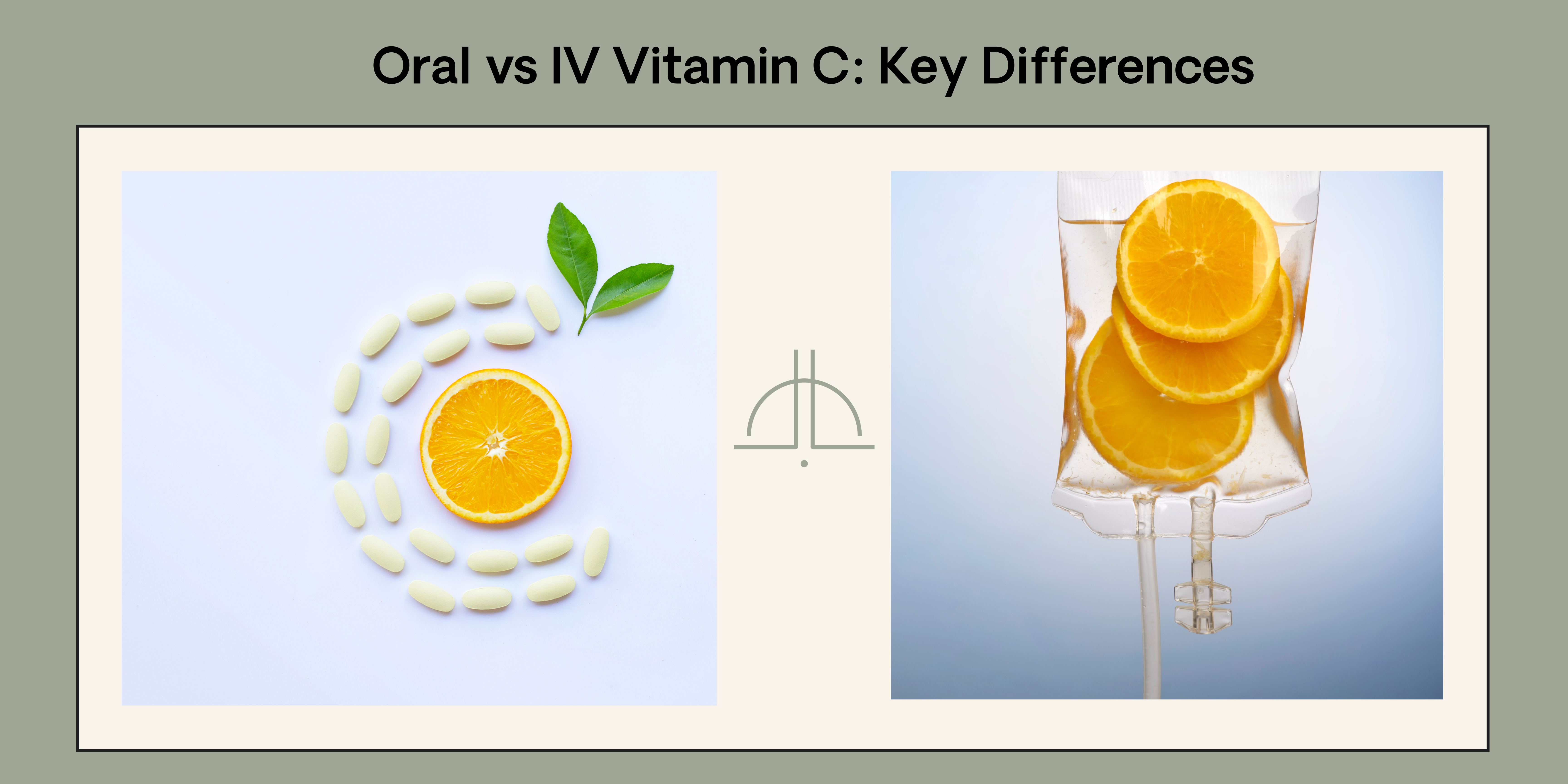

Oral vs IV Therapy for Infections and Longevity
Vitamin C is one of the most well-known and widely used nutrients in the world, especially for immunity. Often thought of as just a cold remedy, research has shown that its role in the body goes far beyond immune support. Vitamin C is vital for maintaining health, protecting against infections, and even improving survival in serious illnesses. Depending on the form—oral or intravenous (IV)—its effects and clinical uses can differ significantly.
The Role of Vitamin C in the Body
Vitamin C (ascorbic acid) is a powerful antioxidant and essential nutrient with several key functions:
- Immune defense: Stimulates white blood cell production and enhances their ability to fight infection.
- Collagen synthesis: Supports skin, blood vessels, tendons, and wound healing.
- Antioxidant protection: Neutralizes free radicals and reduces oxidative stress, a driver of chronic illness.
- Neurotransmitter production: Aids in making dopamine, norepinephrine, and serotonin—important for mood and brain function.
- Iron absorption: Enhances uptake of dietary iron, preventing anemia.
Because humans cannot make or store large amounts of vitamin C, regular intake is necessary to maintain optimal health.
Vitamin C and the Immune System
Vitamin C is concentrated in immune cells such as neutrophils and lymphocytes, where it enhances their ability to migrate, engulf pathogens, and kill infectious microbes. It also protects immune cells from self-damage caused by the reactive oxygen species released during infection.
Low vitamin C levels are common during illness, stress, and in people with chronic health conditions. Deficiency is associated with impaired immunity, increased susceptibility to infections, and slower recovery.
Vitamin C and Infections
Respiratory Infections
Studies show that vitamin C supplementation can shorten the duration and severity of colds and may help prevent infections in people under physical stress.
Sepsis and Pneumonia
Critically ill patients with pneumonia or sepsis often have extremely low vitamin C levels. Clinical trials suggest that high-dose vitamin C—especially given intravenously—may improve oxygenation, reduce inflammation, and even lower mortality in intensive care settings.
COVID-19
During the COVID-19 pandemic, interest in vitamin C surged. Research indicates that IV vitamin C may help reduce severity and support recovery in hospitalized patients, though results vary and larger trials are still underway.

| Oral Vitamin C | IV Vitamin C |
| Absorbed through the digestive tract; limited by intestinal transporters. | Bypasses digestion, directly enters the bloodstream. |
| Blood levels plateau at about 200 µmol/L, even with high doses. | Achieves up to 70-fold higher blood concentrations. |
| Best for daily prevention, immune maintenance, and mild infections. | Best for acute illness, critical care, and when rapid, high-dose delivery is needed. |
| Convenient, affordable, widely available. | Requires professional administration, more costly, less accessible. |
| Few side effects (occasional loose stools at very high doses). | Generally safe, but not suitable for patients with kidney issues or certain genetic conditions (e.g., G6PD deficiency, which can be confirmed with a blood test). |
Effects on Mortality
One of the most striking findings about vitamin C is its potential impact on survival in critical illness:
- Low vitamin C status is linked to higher risk of severe infections and death.
- In sepsis and severe pneumonia, IV vitamin C has been shown to reduce organ failure and improve survival rates in some studies.
- In surgical and ICU settings, high-dose IV vitamin C may reduce complications, shorten hospital stays, and improve long-term recovery.
While more large-scale trials are needed, the evidence suggests that maintaining adequate vitamin C—and using IV vitamin C in critical cases—may influence not just recovery but also overall mortality.
The Bottom Line
Vitamin C is far more than a cold remedy—it’s a cornerstone of immune resilience and a powerful tool in fighting infections. Oral vitamin C is ideal for prevention and maintenance, while IV vitamin C shines in acute and critical care, offering therapeutic levels that oral supplements cannot match.
Considering IV vitamin C therapy? Speak with your naturopathic doctor to learn if it’s right for you. If you are new to Longév we offer complimentary 10 min meet and greet calls with our Naturopathic Doctors.
References:



